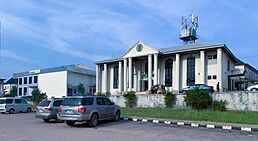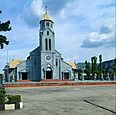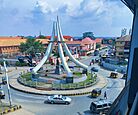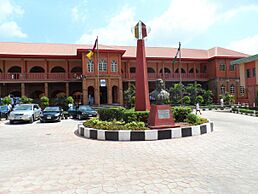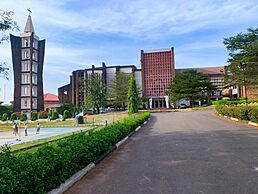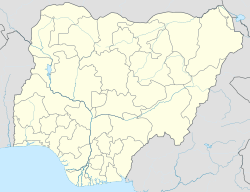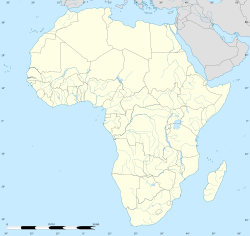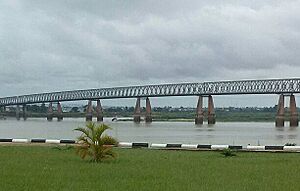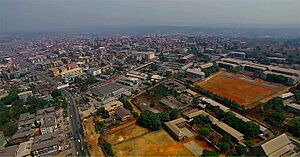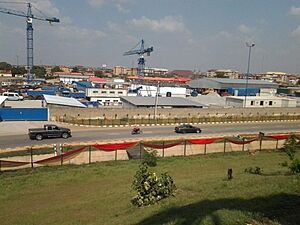Onitsha facts for kids
Quick facts for kids
Onitsha
Ọ̀nị̀chà Mmílí
Port City
|
|
|---|---|
|
Metropolis
|
|
|
From Top to Left to Right: Onitsha Stock Exchange; Basilica of the Most Holy Trinity; DMGS Roundabout; Dennis Memorial Grammar School; Onitsha International Market; Second Niger Bridge; First Niger Bridge; All Saints Cathedral.
|
|
| Nickname(s):
Port City, Onitsha(Osha), Otu, Otu Nkwo
|
|
| Anthem: "With all our hearts, We Pray and ask" |
|
| Country | |
| State | Anambra State |
| LGA(s) |
List of LGAs
Mainland: Onitsha North, Onitsha South
Urban Conurbations: Parts of Anambra East, Idemili North, Idemili South, Ogbaru, Oyi |
| Founded | 1550 |
| Settled | 15th century |
| Incorporated city | 19th century |
| Government | |
| • Type | Constitutional Monarchy, Executive Government, Local Government |
| Area | |
| • Metropolis | 830 km2 (320 sq mi) |
| • Land | 614.12 km2 (237.11 sq mi) |
| • Water | 0.067 km2 (0.026 sq mi) |
| • Urban | 1,965 km2 (759 sq mi) |
| • Metro | 1,965 km2 (759 sq mi) |
| Population
(2022)
|
|
| • Metropolis | 1,695,000 |
| • Density | 2,042/km2 (5,290/sq mi) |
| • Urban | 7,985,643 |
| • Urban density | 4,063.9/km2 (10,525.6/sq mi) |
| • Metro | 8,320,664 |
| • Metro density | 4,234.4/km2 (10,967.1/sq mi) |
| • Demonym | Onye Onicha (singular) Ndi Onicha (plural) (Igbo) |
| GDP (PPP, 2015 int. Dollar) | |
| • Year | 2023 |
| • Total | $18,5 billion |
| • Per capita | $11,400 |
| Time zone | UTC+1 (WAT) |
| Postcode |
430...
|
| Area code(s) | 046 |
| National language | Igbo |
Onitsha (Igbo: Ọ̀nị̀chà Mmílí) is a large city in Anambra State, Nigeria. It sits on the eastern bank of the Niger River. Onitsha and nearby towns form a huge connected city area. This area stretches across parts of Anambra, Imo State, and Delta State.
By 2016, the greater Onitsha area had about 8 million people. This makes it one of Nigeria's largest metropolitan areas. The city's growth connects it to places like Asaba, Nnewi, and Awka. In early 2024, Onitsha itself had about 1,695,000 residents.
Most people in Onitsha are Igbo. They speak the Igbo language. Onitsha is the biggest city and business center in Igboland. This is the traditional home of the Igbo people. People from Onitsha are called Ndi Onicha. Many also speak English and Nigerian Pidgin English. Other Nigerian groups live here too, because Onitsha is a major economic hub.
Experts predict that the greater Onitsha area will be very densely populated by 2050. McKinsey also expects human development to double by 2045.
Contents
Onitsha: A City's Journey
Onitsha slowly grew into an important trading port. This happened in the mid-1850s. It became key for the Royal Niger Company. This was after slavery ended and steam engines were invented. These changes allowed Europeans to travel further inland.
Trade in goods like palm kernels and palm oil grew a lot. This happened around Onitsha's river port in the 1800s.
In 1857, British traders set up a permanent base. Christian missionaries soon joined them. By 1900, Onitsha became part of a British protectorate. The British used Onitsha as a gateway. They set up schools and churches across Igboland from here.
Building the Niger River Bridge
In 1965, the Niger River Bridge was built. It replaced an old ferry crossing. This bridge greatly improved trade routes. It connected Onitsha with western Nigeria. It also boosted business links with Benin City and Lagos.
The Nigerian-Biafran war caused much damage to Onitsha. The city was a major battleground. After the war, many people moved to Onitsha. This was during the oil boom of the 1970s and 1980s. This rapid growth led to many unplanned buildings. It also created a lot of crowded areas.
Ofala Festival: Celebrating Culture
Once a year in October, Onitsha holds the Ofala Festival. This festival happens at the same time as the traditional New Yam festival. In the past, people saw the king and received blessings. Today, it helps Onitsha people keep their culture alive. It is also a big event that brings many visitors to the city.
Onitsha's Location and Environment
Onitsha is on the eastern side of the Niger River. It is across from Asaba, Delta State. It is the furthest point up the river that large ships can easily reach. Onitsha is also the western end of the central Anambra hills.
These features have made Onitsha a major trading hub. It connects coastal areas with the north. It also links eastern and western Nigeria. Onitsha has one of the few road bridges over the wide Niger River. There are plans to build a second bridge south of the current one.
Urban Growth and Challenges
Rapid growth in recent years has helped the economy. However, it has also harmed natural areas. The region is also prone to erosion.
Onitsha has two main seasons. The wet (rainy) season is from March to October. It is warm, humid, and often cloudy. The dry season is from November to February. It is hot and partly cloudy. Both seasons are affected by winds from the Atlantic Ocean. Saharan harmattan winds bring haze in winter. Thunderstorms are common in March/April and late September/October.
Temperatures usually range from 19°C (67°F) to 31°C (88°F). They rarely go below 15°C (59°F) or above 33°C (92°F). Onitsha's climate is known as Aw.
City Life and Development
In the early 1960s, before the Nigerian Civil War, Onitsha had about 76,000 people. The famous Nigerian writer Chinua Achebe described it as a place of great creativity.
Onitsha has played a big role in urban life in Eastern Nigeria. It is known for Onitsha Market Literature. It is also a center for funding and distributing Nollywood films.
However, the city's growth has been very fast. Infrastructure has not kept up. Unplanned buildings have made the city crowded and chaotic. In 2016, the World Health Organization reported that Onitsha had the most polluted air in Africa.
Recently, Onitsha has had land disputes with nearby communities. These disputes are over areas like Fegge, Awada, and 3-3.
Onitsha's Economy
In 2012, the state government worked with SAB Miller. This led to an investment in Onitsha Brewery. The brewery started making drinks in August. This was the first major investment in Onitsha since the 1980s. In January, it was announced that $110 million would be spent to triple the brewery's output.
Getting Around Onitsha
Onitsha can be reached by rivers, land, and air. The city has an international cargo and passenger airport. It is located in Umueri.
Environmental Concerns
Onitsha produces a lot of waste. This is because it is a busy commercial area. Many people come here for business. They mostly generate food waste, polythene bags, and paper. Other waste includes metal, clothes, plastic, tins, and bottles. In 2016, air pollution levels were 30 times higher than WHO standards.
The city's noise levels are also high. They are above the limits set by environmental agencies. This varies between the dry season and wet seasons. Onitsha has a lot of surface water and shallow groundwater. This puts it at high risk of water pollution.
Sister Cities
Onitsha has special partnerships with other cities. These are called twin towns or sister cities:
 Compton, California, United States (since 2010)
Compton, California, United States (since 2010) Indianapolis, Indiana, United States (since 2017)
Indianapolis, Indiana, United States (since 2017)
Famous People from Onitsha
People from Onitsha were among the first Igbo to get Western education. This led to many notable individuals:
- Bishop Alphonsus Chukwuma Onyeabo (1879–1954): He helped translate the English Bible into Igbo.
- Dr. Nnamdi Azikiwe: Known as the "Zik of Africa." He was the first president of independent Nigeria.
- Olisa Agbakoba: A lawyer and human rights activist.
- Ukpabi Asika: A Nigerian academic and civil servant.
- Flora Azikiwe: The first wife of Nnamdi Azikiwe.
- Onyedika Chuke: An artist, curator, and art dealer.
- Ben Enwonwu: A famous painter and sculptor.
- Obum Gwacham: An American football player.
- Emmanuel Ifeajuna: A former army major and high jumper. He was the first Black African to win gold at a major international sports competition.
- Alex Iwobi: A professional footballer who plays for Everton.
- Louis Mbanefo: A lawyer and justice.
- Nwagboka: The last Omu (female leader) of Onitsha.
- Alexander Nwora: A basketball player and coach.
- Tony Nwoye: A Nigerian politician.
- Chike Obi: A mathematician.
- Francis Obikwelu: A retired Nigerian-born Portuguese sprinter.
- Janet Okala: A Nigerian political leader.
- Francisca Nneka Okeke: A Nigerian physicist.
- Henry Onyekuru: A footballer.
Images for kids
See also
 In Spanish: Onitsha para niños
In Spanish: Onitsha para niños
 | Toni Morrison |
 | Barack Obama |
 | Martin Luther King Jr. |
 | Ralph Bunche |


